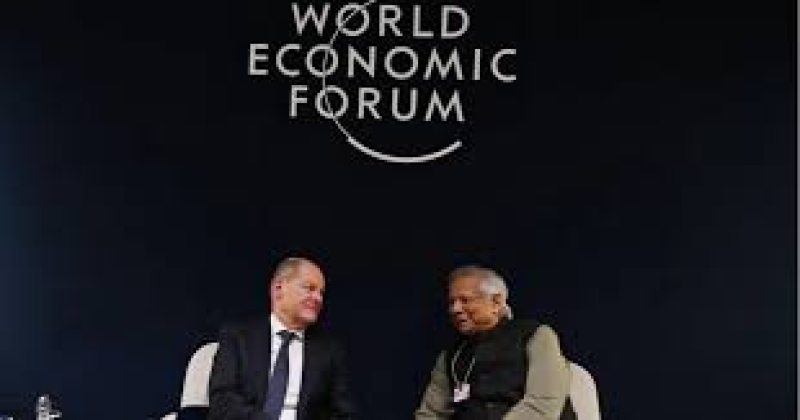- Hasina Gets 10 Years in Purbachal Plot Corruption Cases |
- NASA Finds Ammonia Compounds on Jupiter Moon Europa |
- Remittance Inflow Surges 45% to $3.17bn in January |
- Militant Attacks Kill 33 in Balochistan; 92 Assailants Dead |
- Power generation at Payra Thermal Power Plant 1st unit starts after a month |
Germany Pledges Support for BD’s Democratic Transition

Chief Adviser Professor Dr Muhammad Yunus today held a meeting with German Chancellor Olaf Scholz on the sidelines of World Economic Forum Summit in Davos, Switzerland. Photo : Chief Adviser GOB Facebook page
German Chancellor Olaf Scholz pledged his country's full support for Bangladesh as it navigates its transition to democracy, expressing Germany's commitment to assisting in the reform process.
Chancellor Scholz made the remarks during a meeting with Bangladesh's Chief Adviser, Professor Muhammad Yunus, on the sidelines of the World Economic Forum Summit in Davos, Switzerland.
"You have our full support," Scholz assured Prof. Yunus, who briefed the German leader on the ongoing reform agenda of Bangladesh's Interim Government.
Prof. Yunus shared that he is currently leading a consensus-building commission aimed at uniting political parties around key reforms proposed by six different commissions. Once an agreement is reached, the political parties are expected to sign the July Charter, a document that embodies the democratic ideals sparked by the student-led uprising in July and August.
The two leaders discussed a broad array of topics, including the factors behind the July uprising, Bangladesh's relations with its neighbors, the Rohingya crisis, and the security situation in Myanmar. Prof. Yunus described how young people, including a 12-year-old student who wrote a poignant letter to his mother before joining the protest and ultimately sacrificing his life, played a crucial role in the movement that sought an end to years of misrule in Bangladesh.
In addition to political matters, Prof. Yunus called for enhanced business ties between Germany and Bangladesh. He invited Chancellor Scholz to send a delegation of German business leaders to explore investment opportunities in Bangladesh, stating, "We can be your factory."
Prof. Yunus also reaffirmed Bangladesh's support for the revival of the South Asian Association for Regional Cooperation (SAARC) and stressed the potential benefits of hydroelectric power from Nepal for the entire South Asian region, particularly in advancing the shift toward renewable energy.
Furthermore, Prof. Yunus appealed to Chancellor Scholz for Germany's support in establishing a UN-supervised safe zone for Rohingya refugees in Myanmar’s Rakhine State, emphasizing the urgent need for international intervention to protect the displaced population.
The conversation highlighted a shared commitment to peace, stability, and cooperation in the region, with both leaders pledging to continue working closely together to address these critical issues.

